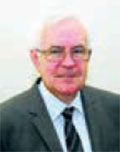
Lewis Rose, deacon, locum minister at Dundee: Meadowside St Paul’s
Would you like to take part in a future Big Question?
Send us your details and interests to magazine@lifeandwork.org or write to us at Life and Work, 121 George Street, Edinburgh, EH2 4YN.
“As I sit down to consider this, I have just been watching the outcome of the American Presidential election which may be a tsunami for the world.
“When it took place, the Reformation was a tsunami for both the church and state as both held power.
“The people, the church also held a great deal of the wealth and gave appointments to their friends.
The power rested in the hands of the few and, as we all know, power corrupts and absolute power corrupts absolutely.
“Has the Reformation been successful for today’s church and society in general?, I have my doubts.
“The church would like to think that it allows power to come up from below and yes it does to a certain extent, but sometimes the ordinary person in the pew gets so far and no further.
“This has to do with power that emanates from the top.
“As I see it the church would wish to move the power back to the people, but as we are all aware change is difficult to achieve.
“The question is, are there people out there who would move change forward? It may be that as most people are content with the way that things are and do not really want to put their head above the wall or maybe the pew.
“Therefore, a balance has to be sought in achieving changing the power structures, as were the aims of the Reformation.”

The Rev Andrea Price, associate minister, London: St Columba’s
“As a young child I walked in the garden under some enormous trees and had the distinct feeling that God was present. Had someone just told me of God, the creator?
“I cannot remember.
“A few years later my best friend took me to her Roman Catholic church, where at the front an eternal light was glowing. My friend told me that God lived there. Maybe I became a Protestant then: I knew that God could not possibly live in a dark church or a tiny red light!
“Growing up I was glad to be protestant or “evangelisch” as this meant I could become a minister.
“However it was a Roman Catholic priest, leading our youth group, who broadened my outlook on matters ecumenical.
“I know to seek God everywhere and not just in church, building or institution. I enjoy exploring the bible for God’s word for us but also appreciate the drama of liturgy, music and symbolic action at times associated with a more Roman Catholic approach.
“God does not need any of our worship, but we need God and all ways to help us focus and understand.
“The many branches of the Christian family tree have much to teach each other.
“The Reformation, begun 500 years ago, reminds me to seek God and question the way we do church, as Martin Luther did. Do we help or hinder people’s closeness to God, Father, Son and Holy Spirit?”

The Rev Charlie Cameron, minister, Johnstone: St Andrew’s
“The Reformation comes to us from the past.
“It can lead us on into God’s future. “The Reformers called on their generation to get ‘back to the Bible.’
“We still need to hear that message today. “For many people in today’s world, the Bible is a closed book – often owned, rarely read.
“The Reformers call us to take the Bible seriously. We’re not only to read the parts that we like. Blessing may come to us from unexpected places.
“The Reformers encourage us to ‘search the Scriptures.’ They believed that God had something to say to them. It was something that they could not keep to themselves. They needed courage.
They were given courage.
“They have set for us a great example – asking the question, ‘Is there a word from the Lord?’ and giving the answer: ‘Yes. There is a word from the Lord.’
“The Reformers directed attention away from themselves to Jesus Christ. This is what we must do.
“The Reformers were whole-hearted in their commitment to Christ. They were God’s faithful servants. They teach us to say, ‘Serving the Lord – this must be the great priority of my life, the most important thing.’
“The Reformation was a time of great change. It was more than social and political change. It was spiritual change. Listening to God led to speaking for him. Speaking to him led to living for him. Real change – this is what we need.”

Jonathan Appleby, Reader, Presbytery of Inverness
“At one level the Reformation means the historical movement, begun by Martin Luther (although there were reformers before him, such as Wycliffe) and continued by Calvin, and (in Scotland) John Knox.
The Reformation was a protest against the abuse of power by the established church, and the subordination of Scripture to church traditions and politics.
“For me, the Reformation is a reminder to remain true to Scripture. Sola scriptura – the Bible is the sole infallible rule of faith and practice.
“That doesn’t mean that I can’t learn much of value from eg the natural world, or from church tradition, or from life’s experiences. Of course I can, and do.
“But when it comes to what I believe, and how I live that out in practice, the Bible has the final word.
“I think our modern ‘western’ society needs a Reformation.
“British society is adrift in a sea of relativism; anything goes, and there are no absolute standards. We can believe what we want, so long as we keep it to ourselves, and don’t let it influence our day-to-day lives. We can choose between so many different ways to live, but how do we know which is right?
“Martin Luther wouldn’t waste any time in pointing us in the right direction: Sola scriptura, he would say! Forget political correctness – go for theological correctness.
“And then make sure it translates into action.”

The Rev Shuna Dicks, minister, Aberlour Parish Church
“The Reformation marked a huge turning point in the history of the church, of that there is no doubt.
“For me the significance was the opening up of the Bible to the masses.
“To have access to a Bible in your own language enabled the Word to be spread all over the world.
“It also meant that interpretation of the Bible became more open.
“Rather than the church dictate what the Word of God was, people were able to read for themselves and hear the Word speak to them personally.
“Biblical scholarship ever since has shown how difficult it is to come to one clear conclusion about many of the more ‘difficult’ passages in the Bible.
“And whilst this has not always been easy for the church universal to deal with, I don’t think it is necessarily a bad thing.
“Reformation is an on-going process. “We live in an ever changing world. We need to reform our lives, so why not our understanding of God’s Word?
“Whilst the words of the Bible are in hard print that doesn’t mean that the Word of God is fixed.
“And the real beauty of the Bible is that the words are fluid, alive and speak to us today as much as they ever did.
“And once we realise this we can make them relevant to people, perhaps the biggest challenge facing the church today.
“This is reformation.”